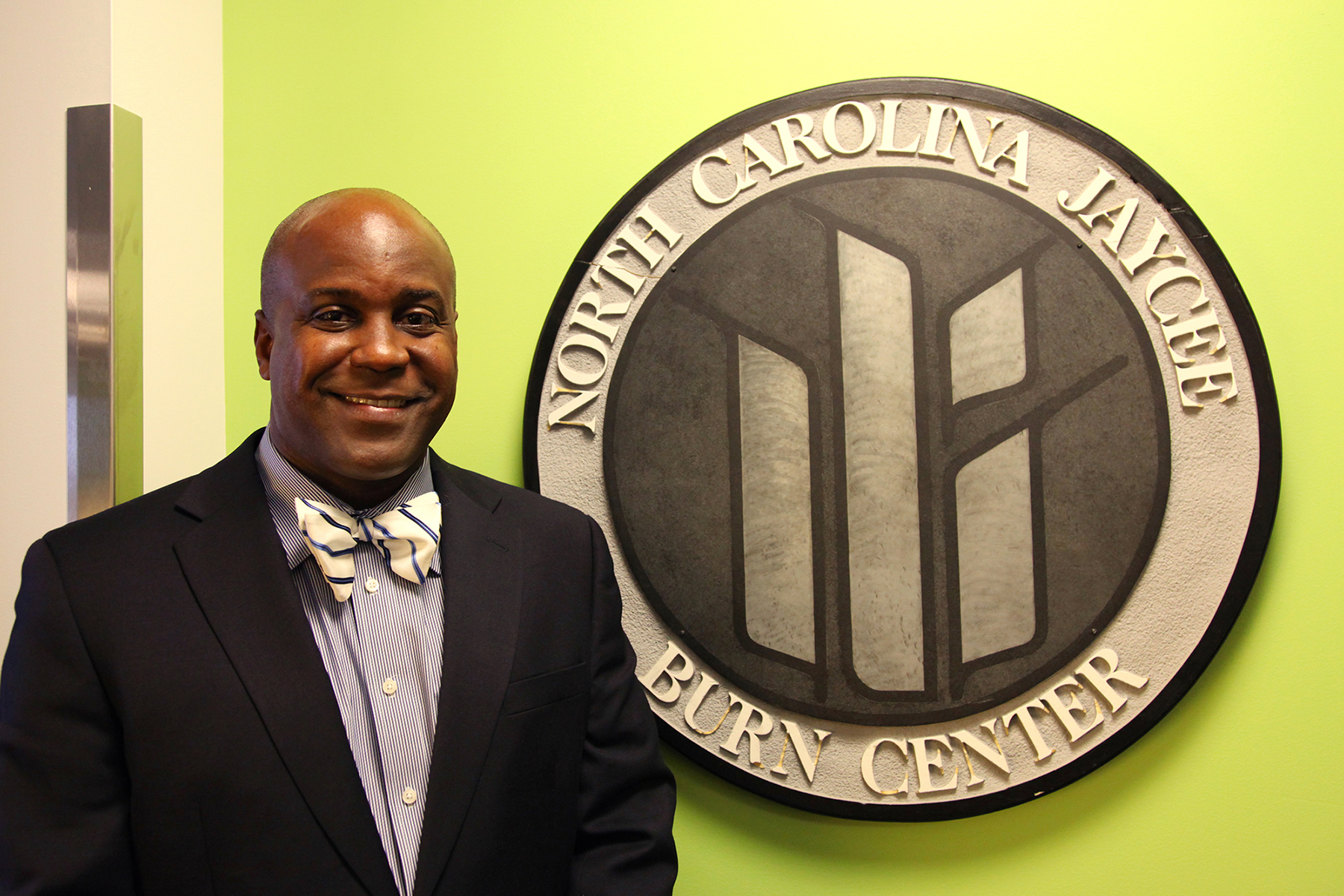
Twelve UNC faculty members became the first group to complete the one-year Academic Career Leadership Academy in Medicine (ACCLAIM). ACCLAIM is a UNC-Chapel Hill School of Medicine program that provides leadership and career development opportunities to junior faculty members, with an emphasis on those underrepresented in medicine.
One of the central requirements of ACCLAIM is that participants propose an idea that they will work on individually to advance research, strengthen teaching and improve the health care system.
The project by Dr. Jones is below.
Sam Jones, MD, treats patients at their most vulnerable, after life-threatening burns. Sometimes the patients arrive at the Burn Center ICU immunocompromised, at risk of becoming sicker, or even dying, from a simple infection. Because the patients lack fully functioning immune systems, they often require the application of specific expertise to treat infections.
“This is a cohort of patients that needs specialized infectious disease attention,” says Dr. Jones, assistant professor in the Department of Surgery and assistant director of the Burn Center.
During his year in ACCLAIM, Dr. Jones developed relationships with people across UNC Hospitals and the School of Medicine, among them infectious disease specialist David van Duin, MD, associate professor of medicine at UNC. His goal was to learn how to advance this understudied area and find improved methods of care for his patients.
After working closely with Dr. van Duin and others, Dr. Jones introduced a research plan that, he and his collaborators believe, can ultimately lead to infection-reducing implementations in immunocompromised patients in the Burn Center ICU. According to Dr. van Duin, their partnership has great potential.
“Sam is a very smart, ambitious, and driven guy,” says Dr. van Duin. “He has done great work in the lab trying to figure out what it is about these patients that puts them at such a high risk of infection.”
If their research leads to new ways of treating patients within the Burn Center, it could translate to other ICUs at the hospital and become a model for immunocompromised burn patient treatment everywhere.
“If we can determine the number of incidents of infection among this population in the Burn Center, as well as the reasons for the incidents, then we can reduce how long these patients stay in the Center, which impacts the health care system in important ways,” says Dr. Jones.
Dr. Jones acknowledges that infectious disease in immunocompromised burn patients is not well understood, which can present challenges. But he’s eager to write a new chapter in the care of his patients. So far, the Burn Center has implemented interventions such as frequent line changes and educational measures for nurses, among other modifications to their care. Within a year, Dr. Jones expects to have data on the success of the interventions.
Meanwhile, the Burn Center is in the process of determining infection rates among patients, creating a registry of all the infections that occur, working on first papers from the information they gather, and applying for a grant so that they can continue their work in a systematic way.
Even with the effective collaborations he has created with Dr. van Duin and others, Dr. Jones knows that challenges lie ahead. What works for other immunocompromised patients, such as solid organ transplant or bone marrow transplant patients, may not be as effective for burn patients.
“There aren’t direct translations among such patients,” he says. “Dr. van Duin and I are learning from each other how to deal with those challenges that are unique to burn patients.”
As their work continues to evolve, Dr. Jones appreciates the role ACCLAIM played in shaping his project into something that makes sense to a broader audience.
“ACCLAIM helps you think on a global level, outside of your specialty, and it encourages you to consider ways to make a bigger impact,” he says. “Part of making a bigger impact is understanding the system in which you work. By working with mentors – in my case Marlene Rifkin – you learn more about the hospital and medical school, gain a better appreciation of why decisions are made, and produce realistic ideas that can change the system.”
Reaching out to other colleagues through ACCLAIM has helped bring down barriers that sometimes prevent progress in a large organization.
“It’s incredibly helpful to work with infectious disease doctors like Dr. van Duin who have experience working with immunocompromised patients,” he continues. “It’s easy to get stuck in your own little world. You often have ideas for improving care that make sense to you and to the colleagues in your specialty, but maybe not to others. Through ACCLAIM, you get a chance to interact with colleagues from different specialties, learn how they think, and talk to them in ways that help you communicate your ideas effectively.”
